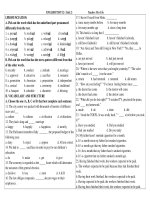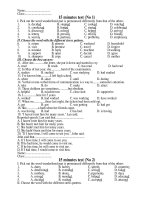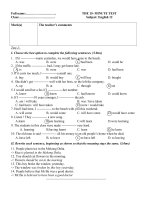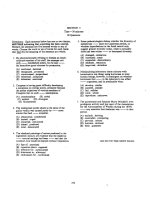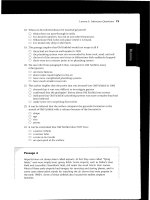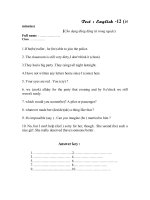LISTERNING TEST 12 15
Bạn đang xem bản rút gọn của tài liệu. Xem và tải ngay bản đầy đủ của tài liệu tại đây (115.34 KB, 40 trang )
TEST 12 . LISTENING | PART 1
1. What will the weather be like tomorrow?
A. Sunny
B. Rainy
C. Cloudy
D. Windy
2. Which musical instrument is the girl learning to play?
A. The drums
B. The guitar
C. The keyboard
D. The flute
3. Where will they meet?
A. Stadium
B. Camera shop
C. Car park
D. Market
4. What will the weather be like in the afternoon?
A. Rainy
B. Sunny
C. Cloudy
D. Windy
5. What time will she take the train?
6. How does the man travel to Liverpool?
A. By train
B. By car
C. By bus
D. By plane
7. What time does the film start?
8. When will the football match start next week?
LISTENING | PART 2
1. What did Vanessa and Robert decide to do last year?
A. Had a baby
B. Get married
C. Travel to England by boat
D. Look for new jobs
2. Vanessa was worried that
A. they wouldn’t be prepared
B. the conditions would be bad
C. the baby would get ill
D. it would take too long
3. How did Vanessa feel when they reached Singapore?
A. She wondered if she would fly home
B. She was worried about the boat
C. She enjoyed the break from travelling
D. She was ready to continue travelling
4. Why was Vanessa’s father-in-law particularly helpful?
A. He was a doctor
B. He was a good cook
C. He looked after the baby
D. He helped to sail the boat.
Question 5 to 8. You will hear an interview with a professional athlete called Ann Brown.
5. What does Ann say about her performance in the world championships?
A. She was sure that she would win
B. She was disappointed not to win.
C. She wishes she’d been more prepared.
D. She did better than she’d been expecting to.
6. How does Ann feel about the place where she trains?
A. She finds it quite boring.
B. She enjoys looking at the scenery.
C. She pays little attention to where she is.
D. She hopes to change it.
7. What does Ann think of the idea of taking a “day off” from training?
A. She thinks all athletes need one sometimes.
B. She would like to have more of them.
C. She doesn’t find them necessary.
D. She thinks taking one day off every week is enough for her.
8. What is Ann’s attitude towards the other competitors in races?
A. She find them unfriendly
B. She avoids close social contact with them.
C. She’s made a few good friends among them.
D. She finds it easy to talk to them when she has to.
9. According to Barbara, a casting director needs above all
A. to learn from experience
B. to have a relevant qualification
C. to be a good communicator
D. to have a natural feel for the job
10. Barbara says that she looks for actors who
A. can play a variety of roles
B. complement each other
C. accept her way of working
D. think deeply about a part
11. At which stage in the casting process does Barbara meet the actors?
A. before she goes to see them performing live.
B. once the director has approved them
C. before a final short-list is drawn up
D. as soon as a final selection is made.
12. What led Barbara to become a casting director?
A. She realized she had the skills needed.
B. She was doing similar work in the theater.
C. She was recommended by a friend.
D. It had always been her ambition.
LISTENING | PART 3
1. What rank the second most popular vegetable in the world?
A. Carrots.
B. Potatoes.
C. Onions
D. Beans.
2. Nowadays, which country produces more carrots than any other country?
A. Japan.
B. China.
C. Russia.
D. The USA.
3. When were carrots first grown?
A. 4,000 years ago in Egypt.
B. 4,500 years ago in Afghanistan.
C. A long time ago in Europe and parts of Asia.
D. 2,500 years ago by the Greek.
4. Thousands of years ago, what was the colour of most cultivated carrots?
A. Purple.
B. Orange.
C. White.
D. They looked like today’s carrots.
5. Rather than something to eat, the carrot used to be regarded as ______.
A. the most important ingredient
B. a fashionable food
C. a medicine
D. a typical thing of the Romans
Questions 6 to 10. You will hear part of a radio programme about
6. Who are forcing supermarkets to change their attitude to excessive packaging?
A. Environmental groups.
B. Their customers.
C. The government.
D. Their own needs.
7. According to a study, how many percent of people want to reduce waste?
8. What are some items in packages that are also wrapped individually?
A. Chocolates.
B. Silver things.
C. Toys.
D. Something that is difficult to get rid of.
9. What do most people think is it wrong to wrap in plastic?
A. Products for kids.
B. Products for entertainment.
C. Fruit and vegetables.
D. Products easy to dig up.
10. What can shoppers at some stores now put excess packaging into when they pay?
A. Cardboards.
B. Plastic wastebaskets.
C. Special containers.
D. Bottles.
Questions 11 to 15. You will listen to part of a lecture in a psychology class.
11. What is the lecture mainly about?
A. An analysis of genetically caused mental disorders.
B. A description of some common anxiety disorders.
C. An evaluation of the causes of some anxiety disorders.
D. A method of comparing different mental disorders.
12. Why does the professor say that many people feel anxious when they visit a dentist?
A. To emphasize the problems faced by social phobics.
B. To indicate that it is rational to have an anxiety attack in som
C. To show that it is irrational to be anxious in many situations.
D. To give an example of a common anxiety trigger for most pe
13. What does the professor say about specific phobias?
A. Their object is usually safe.
B. Their object is often dangerous.
C. They become worse with age.
D. They usually start in childhood.
14. Social phobia might include which of the following fears?
A. Fear of heights.
B. Fear of enclosed spaces.
C. Fear of eating in front of others.
D. Fear of encountering dangerous animals.
15. What does the professor imply about treatment of phobias?
A. Treatment rarely succeeds.
B. Treatment is not usually necessary.
C. Treatment is long and difficult.
D. Treatment takes various forms.
TEST 13. LISTENING | PART 1
1. Which of the following options is NOT a prize for the winners?
A. a drawing book
B. a DVD player
C. pens
D. a book on design
2. What kind of weather does the speaker like best?
A. when it rains heavily
B. when the sun shines
C. when there is fog
D. when it is floody
3. What time should the baby sitter be at the house?
A. 5:00 p.m.
B. 8:25 p.m.
C. 8:45 p.m.
D. 9:00 p.m.
4. What is the telephone number of the program?
A. 034008 895665
B. 034408 895565
C. 034008 859556
D. 033408 995665
5. Which road has been blocked by a car crash?
6. When was the painting painted?
7. The speaker is standing at
A. a museum
B. an office
C. a historic house
D. a botanic garden
8. What do people need to do if they have lost some money?
A. call in at the office
B. contact the police to make a statement
C. contact your insurance company
D. call your bank
LISTENING | PART 2
1. Why did Sophie take up translating?
A. She had studied modern languages at university.
B. She sometimes used to do translations for friends.
C. She enjoyed reading texts in other languages.
D. She travelled to Spain and Italia.
2. At present, which subject is she specialising in as a translator?
A. Medicine.
B. Law.
C. Business.
D. Education.
3. Which, according to Sophie, are the most difficult things to translate?
A. Cultural references.
B. Informal expressions.
C. Scientific and technical words.
D. Words similar to English ones.
4. Where does Sophie get most of her work?
A. Directly from official organisations.
B. Through translation agencies.
C. From contacts in private companies.
D. In emergency cases.
5. The Slow Food Movement was originally started because ______.
A. people wanted more time to enjoy cooking and eating
B. a restaurant was opened in a historic location
C. doctors warned that fast food was bad for people’s health
D. people wanted to show their fast modern lifestyles
6. What, according to Valerie, is Slow Food?
A. Food which is complicated to cook.
B. Food which takes a long time to eat.
C. Food of good quality.
D. Food which is easy and quick to cook.
7. What does Valerie say is the problem with fast food companies?
A. They serve the same food all over the world.
B. They make traditional food producers disappear.
C. Their food is not as healthy as traditional food.
D. What they sell is not the same as what they advertise.
8. According to Valerie, the main aim of the Movement is to improve people’s ______.
A. diet
B. health
C. lifestyles
D. look
Questions 9 to 12. You will hear part of a radio interview in which Gary Peters, a
9. In adventure races, competitors race ______.
A. individually
B. in pairs
C. in groups
D. like marathons
10. Races usually take place in ______.
A. remote places
B. sports stadiums
C. large cities
D. in water
11. One of the main challenges of adventure races mentioned by Gary is lack of ______.
12. For professional athletes, one of the attractions of adventure races is that they ______.
A. learn different skills
B. compete in different surroundings
C. compete as part of a group
D. compete individually
LISTENING | PART 3
1. The magazine is different to a local newspaper because of
A. what it looks like.
B. what it contains.
C. where you can buy it.
D. when you can buy it.
2. The first half of the magazine helps people to
A. choose leisure activities.
B. keep up to date with world news.
C. plan holidays around Britain.
D. know how to travel around the city.
3. The restaurants in the report are chosen because
A. readers recommend them.
B. people have complained about them.
C. the journalists have tried them.
D. their staff are honest.
4. In the second half of the magazine you can find
A. reviews of local artists’ work.
B. reviews of local business.
C. articles to help local businesses.
D. articles about local people.
5. What pleases Lucy about the magazine?
A. the high quality of the writers
B. the attitude of the readers
C. the variety of subject covered
D. the fantastic articles
Questions 6-10: You will hear part of a talk given by an interna
6. Stress may be caused by
A. new teachers.
B. time pressure
C. unfamiliar subject matter.
D. new ways of teaching and learning
7. A personal crisis may be caused by
A. studying for too long overseas.
B. unfinished jobs.
C. business problems in the student’s own country.
D. disruptions to personal relationships.
8. Students may lose self-esteem if
A. they have to change courses.
B. they don’t complete a course.
C. their family puts too much pressure on them.
D. their exam results aren’t very good.
9. Students should consult Glenda Roberts if
A. their general health is poor
B. their diet is too strict.
C. they can’t eat the local food.
D. they don’t like a certain kind of food.
10. Students in financial difficulties can receive
A. assistance to buy books.
B. a loan to pay thei course fees.
C. a no-interest loan to cover study expenses.
D. a low-interest loan to buy furniture.
Questions 11-15 You will hear a s
11. According to Debbie, why do some people fail to eat a balanced diet?
A. They don’t know how to cook.
B. They don’t have enough time to cook.
C. They don’t feel hungry enough to cook.
D. They don’t eat enough fruit and meat.
12. Debbie recommends that staff should keep fit by
A. using a gym.
B. taking up a new sport.
C. take the lift often.
D. changing some daily activities.
13. Which benefit of exercise does Debbie think is most important?
A. It helps you sleep.
B. It keeps your heart healthy.
C. It improves mental skills.
D. It keeps you active
14. What advice does Debbie give the nurses about health and safety?
A. to avoid drinking coffee
B. to use the canteen at night
C. to take regular breaks
D. to work for at least three hours
15. When she talks about hygiene, Debbie asks the nurses to
A. wash their hands regularly.
B. keep away from germs.
C. avoid touching rubbish.
D. help with the cleaning.
TEST 14. LISTENING | PART 1
1. What will the weather be like tomorrow?
A. Sunny
B. Rainy
C. Cloudy
D. Windy
2. Which musical instrument is the girl learning to play?
A. The drums
B. The guitar
C. The keyboard
D. The flute
3. Where will they meet?
A. Stadium
B. Camera shop
C. Car park
D. Market
4. What will the weather be like in the afternoon?
A. Rainy
B. Sunny
C. Cloudy
D. Windy
5. What time will she take the train?
6. How does the man travel to Liverpool?
A. By train
B. By car
C. By bus
D. By plane
7. What time does the film start?
8. When will the football match start next week?
LISTENING | PART 2
Questions 1 to 4: You will hear an interview with a man called John Miller talking about his new
book, The story of Ice cream.
1. What was in the ice cream eaten by the ancient Romans?
A. Fruit and syrup
B. Cream and snow
C. Fruit and ice
D. Cream and fruit
2. In France in 1775, ice cream:
A. was an unusual luxury.
B. was too expensive even for rich people.
C. was eaten by most of the population.
D. was available to ordinary people.
3. What does the interviewer think is a “typical icecream”?
A. An ice cream with different flavors
B. An ice cream with a cone
C. An ice cream with wafer biscuit stuck in the top of it
D. An ice cream with chocolate or strawberry
4. What was Ernest Hamwi selling at the St Louis World Fair?
A. A kind of ice cream
B. Cones for ice creams
C. A kind of biscuit
D. A kind of cake
Question 5 to 8: You will hear a radio interview with Tania Brown, who is talking about how
dissatisfied consumers should make complaints.
5. Tania says that when Rebecca makes her complaint, the most important thing is to:
A. be sure about what she wants to achieve.
B. focus on getting her money back.
C. ask the company certain key questions.
D. show how angry she is.
6. Why does Tania recommend making a phone call?
A. to find the name of the person responsible
B. to find out how the company usually deals with complaints
C. to make a recording of the company’s initial response
D. to save time for waiting
7. What does Tania say about typed versus handwritten letters?
A. handwriting is better – as long as it is neat.
B. typing is preferable
C. both are equally good
D. it depends on the situation
8. What kind of language does Tania recommend for a letter of complaint?
A. very formal
B. appropriately insulting
C. as objective as possible
D. well-organised and business-like
Question 9 to 12: You will hear a talk between a man and a woman about living in dorm.
9. What does the woman think about living in the dorm?
A. You will need to bring a lot of things.
B. It is a great experience.
C. You can have wonderful coffee in the residence.
D. It is a good place to make friends.
10. Why does the man need to take his own bedding and towels to the dorm?
A. The dorm does not provide bedding and towels.
B. The man’s towels are high quality.
C. The bedding and towels provided by the dorm are not good.
D. The man will feel like at home by using his own bedding and t
11. What does the woman say about the dorm showers?
A. The showers need flip flops.
B. The showers are common.
